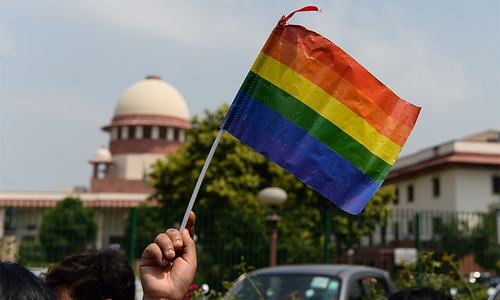At 24, Indian transgender Ray has already had to fight many battles for recognition and now faces a new threat — losing her citizenship because of controversial new legislation.
The Delhi-based law student — whose official documents identify her as male — is among tens of thousands of people protesting against the legislation and a mooted nationwide citizens' register, worried that it will render transgender Indians like herself stateless.
Her fears are not unfounded. In September this year, a petition was filed in India's Supreme Court after around 2,000 transgender persons were left off a citizens' register in the northeastern state of Assam, throwing their future into doubt.
Despite being legally recognised as a third gender in a historic 2014 Supreme Court ruling, they often live on the extreme fringes of Indian society, with many forced into prostitution, begging or menial jobs.
Read more: Revered yet rejected, India's trans women seek their place in parliament
For a community that already faces severe discrimination in conservative India — much of it from their own families — transgender individuals feel they are at extra risk from legislation pushed by Hindu nationalist Prime Minister Narendra Modi aimed ostensibly at tackling illegal immigration.
“Many of us are thrown out of our homes, we run away from our homes facing abuse, we don't have documents for ourselves, how do you then expect the transgender community to prove citizenship?”
If Modi's government goes ahead with its 2019 election pledge to draw up a citizens' register, Ray and others will be forced “to go back to our families which are the first places of abuse most often for trans communities and individuals”, she told AFP.
Transgender makeup artist Tulsi Chandra is among those who dreads having to return to her family in the remote Andaman and Nicobar islands to recover documents.
“The reason I left home and came to Delhi was because my own family looked at me like I was an embarrassment,” the 29-year-old said.
“After the death of my grandparents, I haven't been in touch with anybody in my family because nobody wants to accept me as their own,” Chandra told AFP, as she described what happened to a transgender friend in similar straits.
“At first the family promised to give her the documents but once she reached home, [they started] [...] forcing my friend, who identifies as a woman, to pretend to be a straight male and get married to a woman,” she said.
Official estimates for India's transgender population, who are known locally as “hijras”, do not exist but the community is thought to number several million.
“For transgender people it is difficult to even change your existing documents to the gender and name you identify with, from the one you are assigned at birth,” queer rights activist Rituparna Borah told AFP on the sidelines of a protest against the law.
“We do not even have basic rights [...] like the right to basic health care, right to livelihood, right to partnership,” she said.
“So how do we claim those rights as citizens now that we have to prove again that we are citizens of this country?"















































